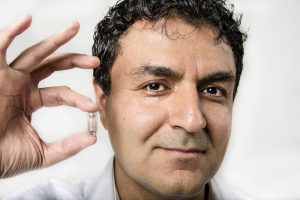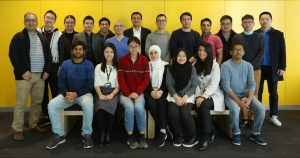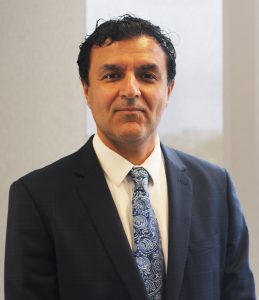FLEET CI Professor Kourosh Kalantar-zadeh (UNSW Sydney) has been awarded the prestigious 2020 Robert Boyle Prize for Analytical Science by The Royal Society of Chemistry.

Prof Kourosh Kalantar-zadeh UNSW) with the ingestible human gas capsule based on 2D material sensoring technology
Prof Kalantar-zadeh is recognised for his significant influence across multiple fields of engineering. Contributions to society coming from his research across multiple disciplines include new innovative pollution sensors, transistors, medical devices and optical systems.
Many of these devices are already commercially available and positively impacting peoples’ lives worldwide—such as highly sensitive immunosensors, new materials for smart windows and reactors for the deposition of atomically-thin electronic materials.
Other innovations are in the final stages of commercialisation, such as ingestible gas sensing capsules used for diagnosing gut disorders.
While Kalantar-Zadeh is internationally recognised in materials sciences, electronics, and transducer research—in particular for his work on liquid metals and 2D semiconductors and sensors—one of his most-satisfying discoveries to date was the invention of an ingestible chemical sensor: the human gas sensing capsule.
“A highlight of my scientific career was seeing the first signals from the ingestible gas sensing capsule that I had swallowed in response to ingredients of an ice cream that I had eaten!”says Kalantar-zadeh.
The Robert Boyle Prize for Analytical Science is awarded for outstanding contributions to analytical science. Awarded biennially, the Prize awards the winner £5000, a medal and (usually!) is accompanied by a UK lecture tour. Robert Boyle (1627-1691) is widely regarded as being the first modern chemist and a pioneer of the modern scientific method famously known for Boyle’s Law, which relates pressure and temperature.
“I feel extremely happy, and at the same time humbled and honoured to be recognised by the Royal Society of Chemistry,” says Kalantar-zadeh. “This prize is an extraordinary honour and humbling to see my name among the best in the history of analytical science.”
The first recipient of the medal, British-Australian physicist Sir Alan Walsh was the original inventor of atomic absorption spectroscopy.
 Within FLEET, Prof Kalantar-zadeh’s team at UNSW with collaborators at RMIT develop the fabrication techniques necessary for advanced devices, using electron and ion beam lithography and other tools for FLEET’s Enabling Technology Theme B (nanodevice fabrication). His research also spans FLEET’s Research themes 1 (topological materials) and 3 (light-transformed materials).
Within FLEET, Prof Kalantar-zadeh’s team at UNSW with collaborators at RMIT develop the fabrication techniques necessary for advanced devices, using electron and ion beam lithography and other tools for FLEET’s Enabling Technology Theme B (nanodevice fabrication). His research also spans FLEET’s Research themes 1 (topological materials) and 3 (light-transformed materials).
This interdisciplinary nature of FLEET appeals to Kalantar-zadeh: “Fundamentally, new innovations are more multidisciplinary these days. We need expertise of different backgrounds to closely work together for several years in order to create good science. While focus on solving a problem is very important, having access to interdisciplinary knowledge and talents is the key that leads to new discoveries and technologies.”
Kourosh Kalantar-zadeh is a 2018 Australian Research Council (ARC) Laureate Fellow and a Professor of Chemical Engineering at UNSW, Sydney, where he directs the Centre for Advanced Solid and Liquid based Electronics and Optics (CASLEO). Formerly, he was a Distinguished Professor of Electronic Engineering at RMIT in Melbourne.

“I have always been proud of the students that I have trained and worked with,” says Kalantar-zadeh, shown here with his team at CASLEO, UNSW. “This award equally belongs to my past and present group members—it’s the outcome of their hard work.”
Kalantar-zadeh has co-authored over 425 research articles and reviews and was named among the 1% most-highly-cited researchers internationally by Clarivate Analytics (2018 and 2019). He sits on the editorial boards of Applied Materials Today, ACS Applied Nano Materials, ACS Sensors, Advanced Materials Technologies, Nano-Micro Letters and ACS Nano. Kalantar-zadeh has been awarded the IEEE Sensor Council Achievement Award (2017), ACS Advances in Measurement Science Lectureship Award (Asia-Pacific region, 2018) and the Walter Burfitt Prize from the Royal Society of NSW (2019).


